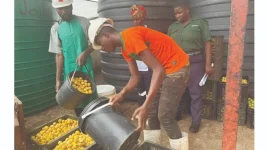Villagers from Mwenezi and nearby areas stand ready to earn almost $20,000 this year by selling 400 tons of wild mapfura fruit. The harvest season kicked off in mid-January and runs until the middle of next month. Women and young people benefit most from this opportunity as they actively gather these valuable fruits from the countryside. Money flows into local pockets, lifting many who previously had limited income options.
The National Biotechnology Authority plant at Rutenga Growth Point has already processed more than 90 tons of marula fruit this season. Good rainfall helped produce an exceptional crop, making villagers confident they'll reach their 400-ton target before the season ends. Many locals call this harvest one of the best they remember in recent years. Over 1,000 previously jobless villagers participate in this money-making activity, creating stronger community bonds as they work together.
The local elder, Mrs. Teererai Nyoni, sees beyond just cash benefits. She points out how the project brings people together in mutual support. Dr. Dexter Savadye, who leads the NBTAZ, highlighted major economic impacts on village life. His team bought 90 tons already, paying around $4,500 directly to fruit gatherers. They expect to purchase 360 tons total by mid-next month. This income helps families invest in education, healthcare, and other essential needs.
NBTAZ focuses beyond immediate profits on improving products made from mapfura, including cosmetic oils, wines, and animal feed. Research teams are working on enhancing the scent and quality of cosmetic oils, with improvements expected next month. The authority plans to sell mapfura brandy by mid-year. Additional products arrive soon—charcoal briquettes launch in May, followed by vinegar and bio-oils hitting markets by September.
Dr. Savadye explained their aim to create diverse products for international markets. Plans extend deeper into rural areas like Mberengwa, Gwanda, Zaka, Bikita, and Chiredzi, where mapfura grows naturally. The authority wants to establish nurseries and plantations for sustainable supply. President Mnangagwa opened the Rutenga processing plant in 2021 as part of Education 5.0, which emphasizes using local resources for economic growth through research.
Villagers feel hopeful as the harvest continues. Selling mapfura represents both financial gain and community achievement. Their success shows how local resources can drive economic progress even in remote areas. Ongoing research, new product development, and community empowerment promise a bright future. As villagers collect fruit today, they build hope, resilience, and sustainable prosperity for future generations.
The National Biotechnology Authority plant at Rutenga Growth Point has already processed more than 90 tons of marula fruit this season. Good rainfall helped produce an exceptional crop, making villagers confident they'll reach their 400-ton target before the season ends. Many locals call this harvest one of the best they remember in recent years. Over 1,000 previously jobless villagers participate in this money-making activity, creating stronger community bonds as they work together.
The local elder, Mrs. Teererai Nyoni, sees beyond just cash benefits. She points out how the project brings people together in mutual support. Dr. Dexter Savadye, who leads the NBTAZ, highlighted major economic impacts on village life. His team bought 90 tons already, paying around $4,500 directly to fruit gatherers. They expect to purchase 360 tons total by mid-next month. This income helps families invest in education, healthcare, and other essential needs.
NBTAZ focuses beyond immediate profits on improving products made from mapfura, including cosmetic oils, wines, and animal feed. Research teams are working on enhancing the scent and quality of cosmetic oils, with improvements expected next month. The authority plans to sell mapfura brandy by mid-year. Additional products arrive soon—charcoal briquettes launch in May, followed by vinegar and bio-oils hitting markets by September.
Dr. Savadye explained their aim to create diverse products for international markets. Plans extend deeper into rural areas like Mberengwa, Gwanda, Zaka, Bikita, and Chiredzi, where mapfura grows naturally. The authority wants to establish nurseries and plantations for sustainable supply. President Mnangagwa opened the Rutenga processing plant in 2021 as part of Education 5.0, which emphasizes using local resources for economic growth through research.
Villagers feel hopeful as the harvest continues. Selling mapfura represents both financial gain and community achievement. Their success shows how local resources can drive economic progress even in remote areas. Ongoing research, new product development, and community empowerment promise a bright future. As villagers collect fruit today, they build hope, resilience, and sustainable prosperity for future generations.












